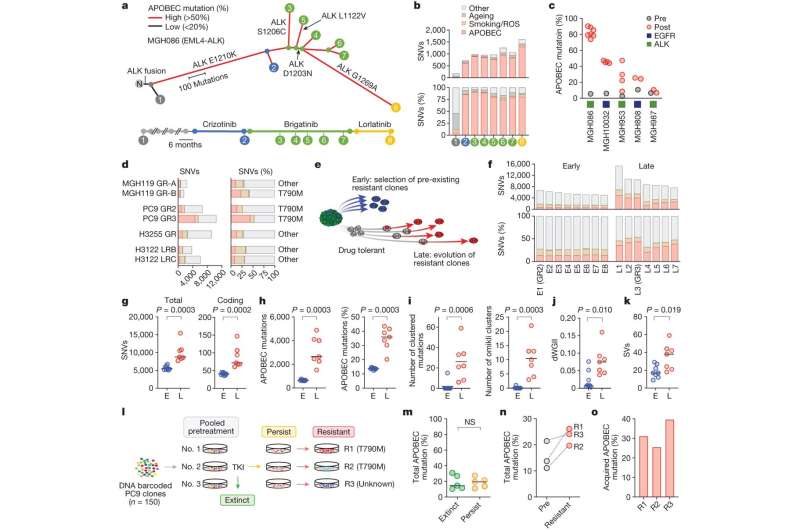This article has been reviewed according to Science X's editorial process and policies. Editors have highlighted the following attributes while ensuring the content's credibility:
fact-checked
peer-reviewed publication
trusted source
proofread
Researchers pinpoint protein tied to drug resistance in patients with lung cancer

Cancer therapies that target specific genetic abnormalities in tumors have revolutionized treatment possibilities over the past two decades. While quality of life and survival are improved with targeted therapies, relapse is common due to the evolution of new tumor cells that are resistant to the targeted therapy.
A new study by investigators from the Mass General Cancer Center, a member of the Mass General Brigham healthcare system, reveals how lung tumors may develop drug resistance over time, pointing to a protein, called APOBEC3A, that could be a promising target. Results, published in Nature, may help researchers develop new solutions for tumor resistance to targeted cancer therapies.
"Traditionally, we treat patients with a drug until the tumor progresses and then we look at what happened in the tumor and try to decide on the next therapy based on what we see in the tumor," said corresponding author Aaron Hata, MD, Ph.D., of the Mass General Cancer Center. "In that sense, the tumor is always one step ahead and we need to react to it. By understanding the fundamental mechanisms of tumor evolution, we can get ahead of the tumor, understand what's driving it, and be able to intervene earlier."
In this study, the authors analyzed non-small-cell lung cancer (NSCLC) tumor cells treated with tyrosine kinase inhibitors (TKIs), a type of targeted therapy. The researchers performed genetic analysis on patient tumors as well as experimentally derived TKI-resistant cells, finding that in both settings, the small population of tumor cells that survived after TKI treatment accumulated mutations of the APOBEC mutation signature.
The authors found that the tumor cells surviving TKI treatment overexpress a type of APOBEC protein, APOBEC3A, which appears to cause drug resistance in two main ways. APOBEC3A can directly cause mutations that are known to result in tumor resistance, such as mutations in the ALK gene. In other cases, the cause of drug resistance is less direct, though the researchers hypothesize that APOBEC3A causes extensive DNA damage that helps push tumor cells into a "persister" state that is more resistant to treatment.
The researchers demonstrated that cell lines without the APOBEC3A gene did not become resistant to targeted therapies as fast as those with the gene. This suggests that targeting APOBEC could extend patients' response to existing targeted therapies; however, no drug exists yet to target APOBEC.
Going forward, the researchers hope to gain further insight into the mechanisms by which APOBEC causes drug resistance, which may shed more light on how to develop a drug to inhibit APOBEC expression or activity. While many NSCLC patients with targeted therapy-resistant tumors have APOBEC mutations, the patients that do not have these mutations would require other solutions. Furthermore, it is not yet clear whether APOBEC drives acquired drug resistance in other cancer types or with use of other targeted therapies.
"Many new cancer therapies that have been developed in the genomic era specifically target 'driver mutations,' such that they do not hurt healthy cells and only affect cells with the mutation driving the tumor progression," said corresponding author Michael Lawrence, Ph.D., of the Mass General Cancer Center.
"Very often, however, a tumor will return, having undergone a change that allows it to survive in the presence of the drug. Our research helps us understand the mechanisms that drive the process of drug resistance, which begin before the tumor becomes resistant."
More information: Hideko Isozaki et al, Therapy-induced APOBEC3A drives evolution of persistent cancer cells, Nature (2023). DOI: 10.1038/s41586-023-06303-1




















